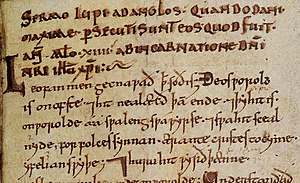
The Sermo Lupi ad Anglos ('The Sermon of the Wolf to the English') is the title given to a homily composed in England between 1010 and 1016 by Wulfstan II, Archbishop of York (died 1023), who commonly styled himself Lupus, or 'wolf' after the first element in his name [wulf-stan = 'wolf-stone']. Though the title is Latin, the work itself is written in Old English. The Sermo Lupi is Wulfstan's most well-known work. In it, he blames a lack of moral discipline amongst his fellow English as the source of God's anger against the English, which has taken the shape of thirty years of Viking raids against England. Wulfstan exhorts the English to behave in a manner more pleasing to God, and specifically to live according to the laws of the Church and of the king. The Sermo Lupi is noted for its rhetorical achievements, and is considered to represent the height of Wulfstan's skill as a homilist and rhetor.[1] The text of the Sermo Lupi has been critically edited many times, most recently by Dorothy Bethurum.[2] The work contains one of several mentions of Old English wælcyrian, a term cognate to the Old Norse valkyrjur—valkyries.